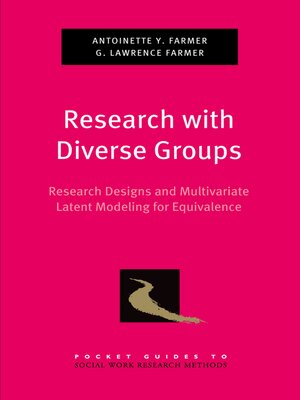Research with Diverse Groups
ebook ∣ Research Designs and Multivariate Latent Modeling for Equivalence · Pocket Guide to Social Work Research Methods
By Antoinette Y. Farmer PhD

Sign up to save your library
With an OverDrive account, you can save your favorite libraries for at-a-glance information about availability. Find out more about OverDrive accounts.
Find this title in Libby, the library reading app by OverDrive.



Search for a digital library with this title
Title found at these libraries:
| Loading... |
Social work researchers often conduct research with groups that are diverse in terms of gender, sexual orientation, race or ethnic background, or age. Consequently, social work researchers must take great care to establish research-design equivalence at all phases of the research process (e.g., problem formulation, research design, sampling, measurement selection, data collection, and data analysis); otherwise, the results might reflect methodological flaws rather than true group differences and therefore lead to erroneous conclusions. This book introduces the methodological precautions that must be taken into consideration when conducting research with diverse groups. Multigroup Confirmatory Analysis (MG-CFA) using structural equation modeling (SEM) was utilized to demonstrate how to assess seven types of measurement and structural equivalence that Milfont and Fischer (2010) have deemed important for studies with diverse samples. A hypothetical example was provided to illustrate how to design a study with good research-design equivalence. A case example was provided to demonstrate how to conduct an MG-CFA for each type of measurement and structural equivalence discussed. The Mplus syntax used to conduct the MG-CFA was provided. The results from the MG-CFA analyses were written up as they would be for publication.






